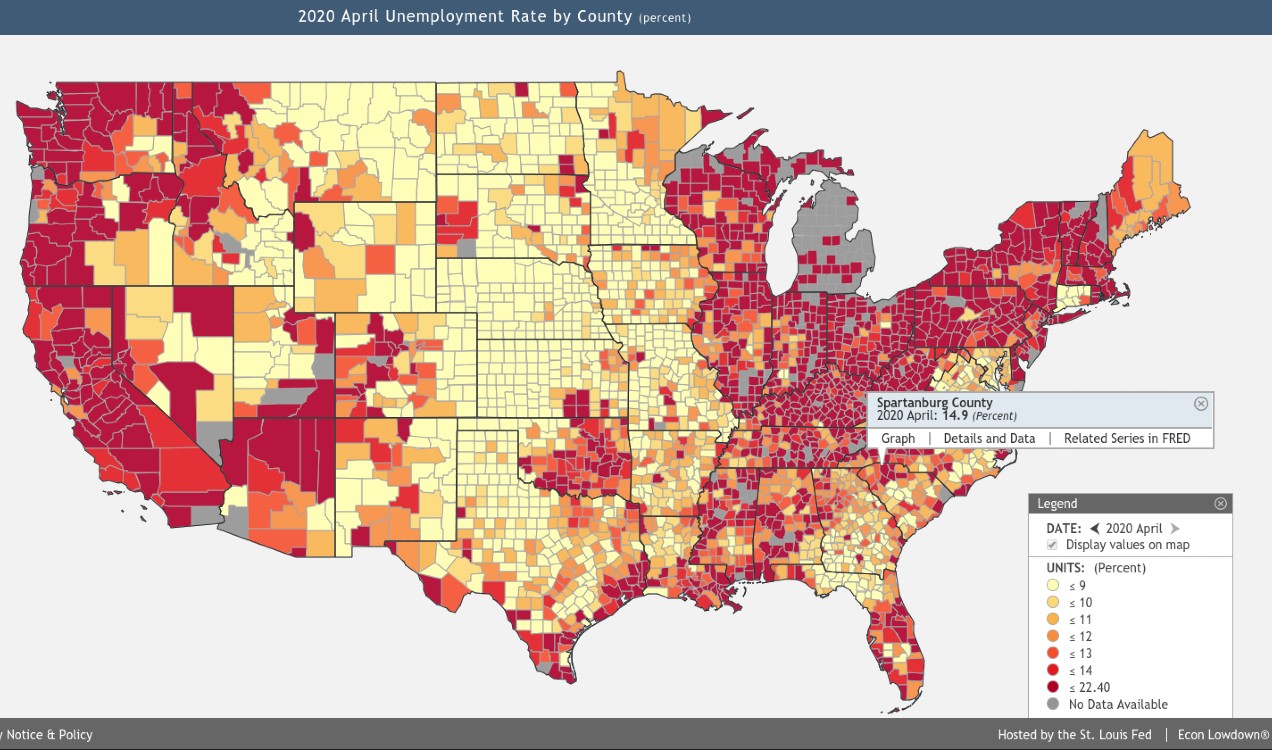
By Lindsay Street, Statehouse correspondent | Every state will lose as the pandemic and its shutdowns eat into tax revenues, according to a national expert in employment data and its implications for state economies.
“Whether your state is a tourist destination, a manufacturing center, or a financial hub, the loss of 20.5 million payroll jobs in the U.S. that month hit every industry in locations nationwide,” Michael Horrigan told The Pew Charitable Trusts this week. Horrigan is the president of the W.E. Upjohn Institute for Employment Research and formerly worked at U.S. Bureau of Labor Statistics, most recently as associate commissioner in the Office of Unemployment and Unemployment Statistics.
He said research shows that on average, a state loses about 3.7 percent of its tax revenue for every percentage point increase in the state’s unemployment rate. So for South Carolina, which saw an increase to the jobless rate from 3.2 percent in March to 12.1 percent in April and with about $825 million in tax revenues per month, about $264 million was lost that month. So far, the Board of Economic Advisers accounted for $400.1 million lost that month.
By the end of May, unemployment claims in South Carolina swelled to 559,531.
“The dramatic increases in state and national unemployment rates in April, and their likely significant understatement, means that without federal assistance, states will face enormous pressure to cut services to meet their legal obligation of a balanced budget,” Horrigan said. “Employment in state services, including education, protective services, job assistance, infrastructure maintenance and repair, among others, may be severely compromised, putting an additional drag on state economies.”
In other news:
![]() S.C. sees surge in coronavirus cases. Gov. Henry McMaster is urging “common sense,” not shutdown, as the state saw its highest jump in new cases (361) yet on Thursday. To date, the state has 12,651 reported cases of the virus. So far, 525 COVID-19 patients have died in the Palmetto State. Meanwhile, state health officials warned the public to “hunker down” and to continue to wear masks when out. Read more.
S.C. sees surge in coronavirus cases. Gov. Henry McMaster is urging “common sense,” not shutdown, as the state saw its highest jump in new cases (361) yet on Thursday. To date, the state has 12,651 reported cases of the virus. So far, 525 COVID-19 patients have died in the Palmetto State. Meanwhile, state health officials warned the public to “hunker down” and to continue to wear masks when out. Read more.
South Carolina approaches seventh day of protests. South Carolina’s cities are still witnessing groups protesting in the wake of national events — all aggressive acts from white people against black people. In a leaked call to President Donald Trump, McMaster claimed some of the protesters are paid and should be “dominated.” Richland County Sheriff Leon Lott said racist extremists were among demonstrators in Columbia. In Charleston, businesses were vandalized Saturday and then there were claims of police responding with undue force, particularly with a video depicting a kneeling protester, professing love for police officers shortly before being arrested. The video made national news. To see more photos, videos and coverage of protests in the Charleston area, visit our sister publication, the Charleston City Paper.
S.C. 9th most dependent on the federal government. South Carolina joins six of its Southern neighbors in the top 10 states most dependent on the federal government, according to an analysis by financial firm SmartAsset. South Carolina, ranked ninth, is joined by West Virginia, Alabama, Mississippi, Louisiana, Kentucky and Tennessee. South Carolina also has the 11th-highest ratio of earnings for federal workers to private workers; the 16th-highest ratio for federal funding to income taxes paid; and the 18th-highest rate for federal share of state government revenue, at 35.19 percent. Read more.
Feds award $18M to bolster police in S.C. Thirteen law enforcement departments in South Carolina will receive $18 million in federal funds to hire additional personnel. Read more.
Higher gas tax coming July 1. A 2-cent increase in gas taxes will be in effect July 1. The increase is part of the phased increase to the state’s gas tax that was passed in 2017. Read more.
S.C. congressmen push for rural broadband funding. All nine members of South Carolina’s congressional delegation, from both parties, signed a letter requesting investment in rural broadband expansion. Read more.
McMaster’s powerful chief of staff profiled. McMaster’s chief of staff Trey Walker has earned the moniker “Governor Walker” among some in Columbia. The nickname reflects the perception that the unelected official is the power behind the office. Read more.
- Have a comment? Send to: feedback@statehousereport.com


